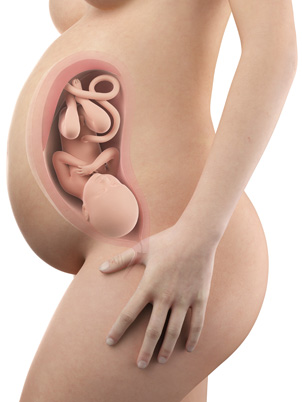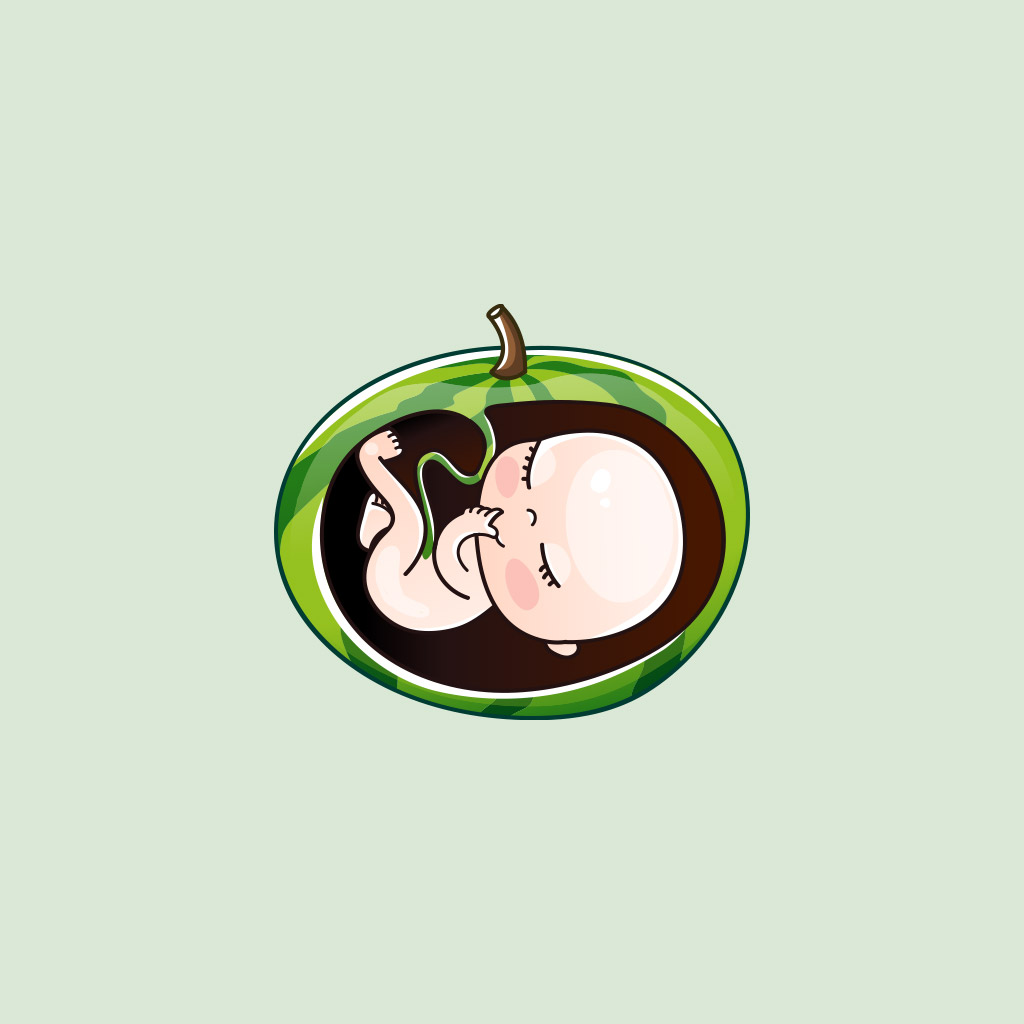Welcome to Week 38! You’ve made it so far, and you’re almost at the finish line. At this point, your pregnancy is considered “full-term,” and your baby could safely arrive at any time. While waiting for labor to start can feel both exciting and nerve-wracking, keep in mind that everything you’re experiencing is entirely normal — and you’re doing an incredible job.
Your baby is now about the size of a small watermelon, and most of their major growth is nearly done. In these final days, your little one is just getting plumper and practicing the skills they’ll need for life outside the womb—like sucking, swallowing, and grasping. Their lungs and brain are still developing, but they’re already well-prepared for their big debut.

Right now, you might feel extra tired or notice more lower back pain and pelvic pressure. Many moms describe feeling heavier and slower, and that’s no surprise—your body is working hard! Everyday tasks may take more effort, so remember to take it easy and ask for help if you need it. Staying hydrated and eating small, frequent meals can help with heartburn or discomfort in these final weeks.
It’s completely normal if you’re feeling a mix of anticipation and anxiety. Some women experience contractions called Braxton Hicks, or notice a “nesting” urge—the sudden energy to tidy up and get everything ready for the baby. Others might see their “mucus plug” come out or have a bit more discharge. These can be signs that your body is preparing for labor, but they don’t always mean labor will start right away.
Now is a great time to double-check your bags for the hospital or birthing center and review your birth plan. Try to relax and enjoy these last precious days of pregnancy, even if it’s hard to get comfortable. Your medical team is here to answer any questions or concerns you might have, so don’t hesitate to reach out. You’re nearly there, and soon you’ll be meeting your new baby!
Your Baby’s Development This Week
At 38 weeks pregnant, you’re in the home stretch—your little one is nearly ready to meet you! While your baby’s growth has been nothing short of amazing over the past nine months, Week 38 is all about final touches and getting ready for life outside the womb.
Right now, your baby is about the size of a stick of rhubarb, stretching nearly 20 inches from head to heel and likely weighing around 6 pounds, 6 ounces. Those numbers may sound impressive, and it’s all thanks to the healthy habits and care you’ve been providing.
- Organs Almost Ready for Debut: Most of your baby’s vital organs—like the heart, kidneys, and liver—are now fully developed and working hard behind the scenes. The brain and lungs are adding their finishing touches, ensuring your baby is prepared for that all-important first breath and all the sensations of the busy world.
- Lung Maturity: Over the last several weeks, your baby’s lungs have been producing an important substance called surfactant. This special “coating” helps keep air sacs in the lungs open once your baby starts to breathe—one of the final hurdles before birth.
- Layers of Baby Fat: Your baby has been storing up fat, giving those knees, shoulders, and cheeks a slightly chubbier look. This healthy fat will help keep your baby warm and provide energy after birth, especially for those first few days of feeding.
- Shedding the Extra: You might remember your baby was once covered in fine, downy hair (lanugo) and a protective creamy coating (vernix). By Week 38, most of that has disappeared, leaving your baby’s skin smooth and ready for cuddles.
- Gender-Specific Changes: If you’re having a boy, his testicles have likely moved down into the scrotum. For girls, the labia are now fully formed. These subtle differences are just another sign your baby is ready to make their arrival.
- Swallowing and Sucking: Even now, your baby continues to swallow amniotic fluid, practicing the movements needed for feeding. Your little one has also mastered the grip reflex—be ready for that first precious finger squeeze!
Over these final days, your baby is still learning from you. Antibodies are crossing the placenta, providing your little one with important defenses against germs right from birth. You might picture your baby curled up with their head down low, getting settled for that big journey.
Each day, your baby’s nervous system is becoming more refined, smoothing the way for all those sights, sounds, and cuddles awaiting them. While it might feel like these last weeks are dragging, remember: your baby is putting the finishing touches on their body and brain, getting stronger, and preparing for all the adventures ahead—you’ll be holding your new arrival before you know it!
Changes in the Mother’s Body
At 38 weeks, your body is getting ready for the big event: meeting your baby! Although you may feel a mix of excitement and impatience, it’s normal to notice fresh changes in how you feel every day. Think of this week as the final rehearsal before labor begins. Understanding these changes can help you feel more confident and prepared as you wait for your little one’s arrival.
The “Drop” or Baby Settling Lower
One of the clearest changes many women notice is the “lightening,” which is when your baby moves deeper into your pelvis. It might make you feel like you’re waddling a bit more, and some moms describe a new kind of pressure “down low”—almost like carrying a bowling ball between your legs! The good news is, this shift can give your lungs more breathing room. On the other hand, it may make you run to the bathroom much more often, since your baby is now pressing on your bladder.
- Pelvic Discomfort: That extra pressure can sometimes cause sharp twinges or aches in your pelvis, groin, or even your thighs. You might feel occasional shooting pains—often called “zingers”—if your baby’s head settles on a nerve.
- Backaches and Soreness: The weight of your growing belly, combined with the relaxation of ligaments as your body prepares for labor, can make your lower back and hips feel sore. A warm bath, gentle stretches, or even using a pregnancy pillow for support can bring some relief.
Cervical Changes
You may not notice this yourself, but your cervix is getting ready too. It starts to soften, become thinner (efface), and open up (dilate). These early changes don’t necessarily mean labor will start right away—some women start to dilate weeks before their due date while others only do so during labor. Your doctor may check your progress at your weekly visits.
Digestive Surprises
As hormones shift, you might find yourself running to the bathroom with loose stools. This is your body’s way of making space for delivery. Some moms also report a sudden interest in cleaning and organizing—often called the “nesting instinct.” If you’re feeling bursts of energy, enjoy them, but remember to rest when you need it.
- Swelling: Feet, ankles, and hands may appear puffier than usual. Elevate your legs when you can and stay well-hydrated.
- Sleep Struggles: Getting comfortable at night can be tough. Try propping yourself up with extra pillows or practicing relaxation techniques before bed.
- Breast Changes: You may notice your breasts leaking a yellowish fluid called colostrum. This is your baby’s first nourishment after birth—your body’s amazing way of getting ready to feed your newborn.
Emotional Shifts
Between anticipation and tiredness, it’s natural to feel more emotional. You might find yourself feeling anxious one moment and excited the next. Sharing your feelings with loved ones or your healthcare team can be a big help.
The finish line is close! Keep listening to your body, ask for help when you need it, and take these changes as signs that you’re nearly ready to meet your baby. Every ache and flutter has a purpose—your body is doing exactly what it needs to bring your little one into the world.
What to Expect at Your Week 38 Prenatal Checkup
At 38 weeks, you’re nearly at the finish line! Your weekly prenatal appointments are meant to keep you and your baby safe and well as delivery gets closer. Here’s what usually happens at this time and what your care team will be paying extra attention to:
- Checking Baby’s Position: Your doctor or midwife will gently feel your belly or may use their hands during an exam to make sure your baby is head-down and getting ready for birth. This helps them know if everything is lined up for a safe delivery or if any extra steps are needed.
- Measuring Your Progress: A quick pelvic exam may be done to see if your cervix is starting to open (dilate) or thin out (efface). These changes are signs your body is getting ready for labor. Every woman is different—some notice changes for weeks, while others don’t until labor really begins.
- Monitoring Your Blood Pressure and Urine: Each visit, your blood pressure and urine will be checked to look for signs of complications, such as preeclampsia (a pregnancy-related high blood pressure condition). Staying on top of this helps prevent surprises and keeps you feeling your best.
- Tracking Baby’s Movements: You’ll likely be asked about your baby’s kicks and wiggles. If you’ve noticed a big change in activity, always mention it. Consistent movement is a positive sign that baby is thriving.
- Heartbeat Check: Listening to your baby’s heartbeat with a small doppler device is a regular part of checkups and never loses its charm. It’s also an important way to monitor your baby’s wellbeing.
- Reviewing Your Questions and Symptoms: If you’ve experienced swelling, headaches, blurry vision, or anything that feels out of the ordinary, now’s the time to speak up. No question is too small at this stage, and your provider wants you to feel prepared and confident.
- Special Checks for Some Moms: If you have a health condition, are carrying twins, or had an earlier complication, you might get extra monitoring. This could mean an ultrasound to check the baby’s size and fluid or a quick test called a biophysical profile to observe baby’s movements and practice breaths.
It’s completely normal to feel both excitement and nerves at this point. Your prenatal visits are designed to give you peace of mind and catch any problems early. Make sure to bring your birth plan (if you have one) and your list of questions. As always, your care team is by your side every step of the way.
If you notice regular strong contractions, a sudden gush or steady trickle of fluid, bleeding, or any concerns about your baby’s movements—call your clinic or hospital right away. It’s always better to reach out, even if you’re unsure. You’re almost there, and every checkup is helping you get ready to meet your little one, safe and sound!
Nutritional Tips and Physical Exercise
At 38 weeks pregnant, you’re almost at the finish line! Your body is working hard to nourish your baby and get ready for birth, so giving yourself good fuel and gentle movement can make a big difference in how you feel right now. Here’s what you can focus on this week:
- Choose Gentle, Balanced Meals: As your baby grows and takes up more space, your stomach might feel fuller, faster. Smaller meals throughout the day—full of fresh fruits, leafy greens, whole grains, and lean proteins—can help keep your energy steady without causing discomfort.
- Support Your Baby’s Brain: Omega-3 fatty acids (found in foods like salmon, walnuts, and chia seeds) are important for your baby’s brain and eyes even at this late stage. If you don’t eat fish, try adding a spoonful of flaxseed to oatmeal or yogurt.
- Pay Attention to Iron and Vitamin C: As you get ready for delivery, your body builds up iron stores to help with blood loss during birth. Boost iron absorption by pairing sources like spinach or beans with fruits rich in Vitamin C, such as oranges, strawberries, or bell peppers.
- Handy Snacks for Labor Prep: Pack easy-to-digest, energy-boosting snacks in your hospital bag—like bananas, crackers, applesauce, or granola bars. If you go into labor at night or unexpectedly, these snacks can come in handy.
- Staying Hydrated Matters: Try sipping water throughout the day, and consider adding a slice of lemon or a splash of juice for taste. Proper hydration helps with swelling, digestion, and can even make contractions more effective once labor starts.
- Gentle Movement Is Still Helpful: Light activities—like slow walks, stretching, or simple prenatal yoga—can ease tension, encourage better sleep, and help your baby settle into a good position. Listen to your body—if you feel tired, rest, but a short walk outside or quiet stretching can boost your mood and circulation.
- Pelvic Floor Exercises: It’s never too late to practice Kegel exercises. Gently tightening and relaxing your pelvic muscles can help with delivery and recovery afterward. Try doing a few sets each day while sitting or lying down.
- Be Mindful of Your Balance: Your center of gravity has shifted, and your joints may feel looser than usual because of pregnancy hormones. Always use handrails on stairs, avoid slippery floors, and don’t push yourself too hard, especially if you feel dizzy or off-balance.
- Nest, But Don’t Overdo It: If you feel a burst of energy and want to tidy or organize, that’s your nesting instinct kicking in. Just remember to pace yourself, ask for help with lifting heavy things, and take breaks as needed.
Every mom’s experience is a bit different—trust how your own body feels, and don’t hesitate to call your healthcare team if you have questions about what to eat or how active you should be. Taking care of yourself this week means you’re giving your baby the very best start. You’ve got this!
Weekly Checklist
You’re officially in the home stretch! As you enter week 38, taking care of yourself and staying prepared for labor can help you feel calmer and more confident. Here’s a friendly checklist to help guide you through this exciting week:
- Double-check your hospital bag. Make sure you’ve packed essentials for both you and baby, such as comfortable clothing, toiletries, snacks, phone chargers, and a coming-home outfit for your little one. Don’t forget important documents like your ID and insurance card.
- Keep your phone charged and numbers handy. Save your provider’s phone number, the hospital’s labor and delivery desk, and emergency contacts in your phone and somewhere visible at home.
- Finalize childcare or pet care arrangements if you have older children or animals at home, so you’re ready if labor starts suddenly.
- Try gentle movement, like walking or prenatal stretching, unless your provider has advised you otherwise. Staying active can help ease discomfort and support your energy level as labor approaches.
- Eat small, nutritious meals throughout the day. Focus on foods that give you steady energy, like oatmeal, yogurt, fruit, lean proteins, and whole grains, especially if you’ve been feeling more heartburn or nausea lately.
- Stay hydrated! Keep a water bottle nearby and sip regularly—labor is like a marathon, and being well-hydrated prepares your body.
- Rest whenever you can, even if it means taking short naps or just putting your feet up. It’s normal to feel more tired at this stage, and you’ll want to save up your strength.
- Pay attention to your baby’s movements. If you notice a sudden drop in activity, call your healthcare provider right away. Daily movement still matters, even this late in pregnancy.
- Read up on the signs of labor and practice timing contractions, so you’ll know what to watch for. Have a plan for when to call your provider or head to the hospital.
- Double-check your route to the hospital or birthing center. If you need directions or alternative transportation at odd hours, plan ahead—just in case.
- Line up some easy freezer meals or snacks for postpartum. Even if you don’t feel up to big kitchen projects, having some heat-and-eat meals or snacks handy will be a lifesaver after baby arrives.
- Give yourself permission to take it easy. It’s perfectly fine to say no to extra plans right now—your main job is to rest, nest, and look forward to meeting your little one.
Remember, every pregnancy unfolds a little differently, so listen to your body and don’t hesitate to reach out to your provider if you’re unsure about anything. You’re almost there, and everything you’re doing matters for you and your baby. Take a deep breath—you’ve got this!
When to Call Your Provider
It’s completely normal to feel a mix of excitement and uncertainty as you near your due date. While many changes at 38 weeks are part of the body’s natural preparation for birth, there are some symptoms that mean you should call your doctor or midwife right away. Trust your instincts—if something doesn’t feel right, it’s always best to reach out for extra support.
- Watery Leaking or Sudden Gush: If you notice a steady trickle or a sudden gush of clear fluid from your vagina, your water may have broken. Contact your doctor even if you’re not sure, as this could mean labor is starting or the baby’s protective environment has changed.
- Bright Red Bleeding: Light spotting can be normal, but if you see more than just a small amount—especially if it’s bright red or heavy—call right away. This kind of bleeding could show a problem that needs attention.
- Severe or Lasting Abdominal Pain: Aches and pressure are common, but if you have intense pain that won’t ease up or severe cramps that take your breath away, let your healthcare provider know as soon as possible.
- High Fever: If you develop a fever over 100.4°F (38°C) along with chills, call your doctor. Fevers can sometimes signal an infection, which needs to be checked quickly.
- Change in Baby’s Movements: Your baby should still be moving regularly at this stage. If you notice your baby is suddenly moving a lot less, or you don’t feel those reassuring kicks and rolls like usual, call your provider immediately.
- Severe Headache, Blurred Vision, or Swelling: If you develop a headache that won’t go away, problems with your vision (like flashing lights or spots), or sudden swelling in your face and hands, get in touch. These can be warning signs of preeclampsia, a condition that needs prompt care.
- Ongoing Vomiting or Trouble Keeping Anything Down: Occasional nausea can pop up, but if you’re unable to keep fluids or food down for more than a few hours, let your doctor know so you don’t get dehydrated.
- Difficulty Breathing or Chest Pain: If you have trouble catching your breath or notice pain or tightness in your chest, seek medical attention right away.
- Signs of Labor Before You Expect Them: Regular painful contractions that come every 5 minutes or less and last at least an hour, especially before your due date, should prompt a call—especially if you’re expecting twins or have other health concerns.
- Feeling Unwell in Any Unusual Way: If you simply feel “off” and can’t explain why, or if you’re worried about any new symptom, it’s okay to check in for peace of mind. Your team is there to help you and your baby stay safe and healthy.
Your doctor or midwife is ready to listen, reassure, and guide you. Don’t hesitate to call—even if you think your question is small. You deserve to feel confident and cared for as you get ready to meet your little one.
Preparations for Baby
With just a little while left to go, it’s normal to feel both excited and a bit anxious as you get ready to welcome your newborn. Whether you’re finishing up last details or just now getting started, here are some simple and caring ways to prepare emotionally and at home for your baby’s arrival in Week 38.
- Take time for yourself. These last days can feel long, so allow yourself moments of rest. Listen to your favorite music, take a warm bath, or read something uplifting. It’s okay to slow down and soak in the quiet before baby’s arrival.
- Lean on your support system. Reach out to friends or family for company, or just to share how you’re feeling. Let others help with meals, errands, or household chores—you’ll be glad for the extra pair of hands.
- Put the finishing touches on baby’s space. No need for perfection—just focus on making things comfortable and ready. Lay out a few onesies, blankets, and diapers where you can easily grab them. Adjust the lights for cozy evenings or quiet nighttime feedings.
- Prepare for the first days at home. Consider cooking a couple of simple meals ahead and freezing them, or making a list of easy snacks and grocery essentials for your partner or loved ones to pick up.
- Try a practice run. Walk through getting from your home to the car and then to the hospital or birth center with your bag and any baby gear you’ll need. This helps ease last-minute jitters and gives you confidence for the big day.
- Pamper yourself. If it brings you comfort, treat yourself to something small—a cozy new pillow, a gentle massage, or a new water bottle by your bed. Sometimes, tiny comforts make all the difference.
- Create a calm mindset. Jot down a short list of things that help you relax or make you smile. Stick it on the fridge or keep it on your phone for those moments when you need a positive little boost.
- Double-check your important paperwork. Make sure your identification, insurance card, and baby’s first outfits are set aside. If you have a birth plan, tuck a copy into your hospital bag.
Above all, remember that you’ve done so much already to prepare for this moment. Trust in yourself, lean into support from those around you, and know that every parent learns as they go. You and your baby are about to start an amazing new chapter—one day at a time.
Citations and References
The American College of Obstetricians and Gynecologists (ACOG) – Provides week-by-week pregnancy guidance, including fetal development, maternal changes, and what to expect at prenatal appointments at 38 weeks. Visit Source
Mayo Clinic – Details fetal growth, maternal symptoms, medical checkups, and nutrition recommendations at 38 weeks of pregnancy. Visit Source
Centers for Disease Control and Prevention (CDC) – Offers nutrition advice and discusses prenatal care milestones for late third trimester and recommended vitamins (such as folic acid). Visit Source
Cleveland Clinic – Outlines common symptoms, fetal position, and what happens during week 38 of pregnancy, including pelvic exams and possible signs of labor. Visit Source
National Institutes of Health (NIH) – Provides information on fetal development, late-stage pregnancy changes, and importance of nutrition in the third trimester. Visit Source
World Health Organization (WHO) – Discusses antenatal care best practices for late pregnancy and monitoring before birth. Visit Source
NHS (National Health Service, UK) – Offers a comprehensive week 38 pregnancy guide, detailing fetal development, maternal changes, and preparations for labor. Visit Source










